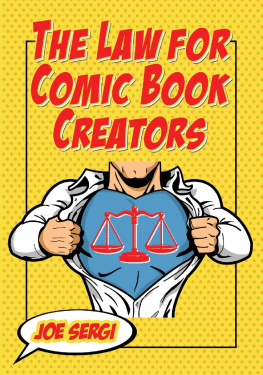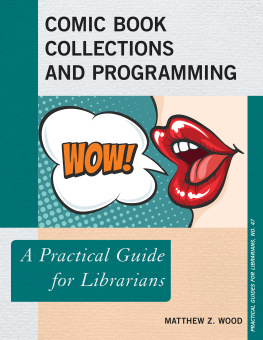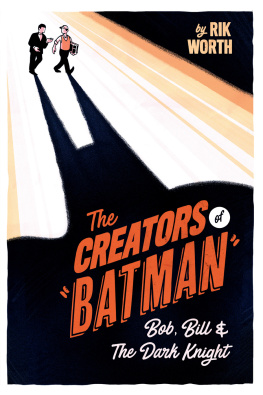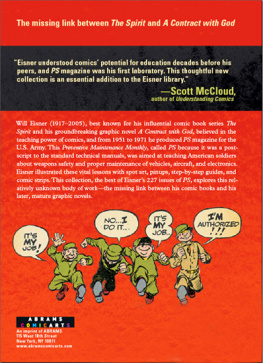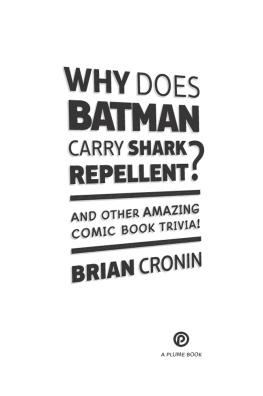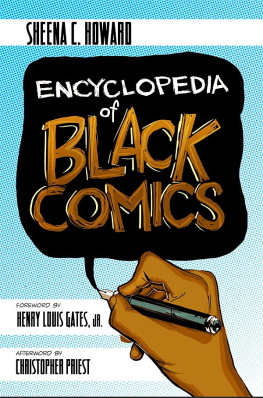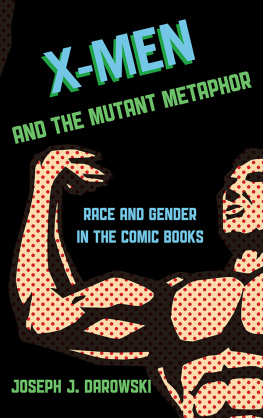The Law for Comic Book Creators
Essential Concepts and Applications
Joe Sergi
McFarland & Company, Inc., Publishers
Jefferson, North Carolina
LIBRARY OF CONGRESS CATALOGUING DATA ARE AVAILABLE
BRITISH LIBRARY CATALOGUING DATA ARE AVAILABLE
e-ISBN: 978-1-4766-1733-6
2015 Joe Sergi. All rights reserved
No part of this book may be reproduced or transmitted in any form or by any means, electronic or mechanical, including photocopying or recording, or by any information storage and retrieval system, without permission in writing from the publisher.
Cover graphics iStock/Thinkstock
McFarland & Company, Inc., Publishers
Box 611, Jefferson, North Carolina 28640
www.mcfarlandpub.com
To the writers, artists, and companies in this book
who are dedicated to storytelling
and not afraid to fight for what they believe in.
And the lawyers that represented them.
Acknowledgments
Acknowledgments are hard. Invariably, the author misses someone. To that someone, I apologize. Obviously, I have to thank my family. My wife and daughter have no idea how much they did to make this book a reality. From a quiet bit of encouragement to knowing when to leave me alone to finish a thought before it faded into obscurity. I also have to thank my parents. Without them buying me my first comics for sending me to law school, this book could never have become a reality.
Next, there is the practical help. This book would still be an idea if not for my good friend Rob Anderson, who not only introduced me to McFarland and is a talented comic book creator, but, as a lawyer himself, was invaluable in discussing the cases during our regular lunches. In addition, Andy Schmidt and his Comics Experience work group provided an excellent conduit to discuss what issues were relevant to todays creator. My nephew Dan Sherrier, a talented novelist in his own right, helped make sure I was making sense. Thanks to my current and former co-workers in my unnamed government agency, especially Adair, Beatrice, Chad, David, Jennifer, Jeremy, Karen, Kari, Kaycee, and Virginia, who had to listen to more obscure comic book law facts than any human should endure and were always there to discuss legal and trial theories. Thanks also goes out to the folks at the CBLDF, especially Charles Brownstein and Betsy Gomez, for the great work they do they and for helping me hone my research skills through my work with their site. I would also like to thank the numerous court clerks, research librarians, and legal scholars that patiently create, maintain, and provide access to sometimes decades-old case dockets and filings.
Table of Contents
Preface
Since the creation of the comic book, there has been legal conflict and confusion. The first comic strip, Hogans Alley , resulted in the first lawsuit over licensing. Superman, the first comic book superhero, spawned a seemingly never ending battle over who owned the character. In the forties and fifties, the comic industry came under fire for contributing to the delinquency of minors, which resulted in the passage of several criminal anti-comic laws and the creation of the self-regulating body known as the Comics Code Authority. It can all be very confusing to the lay person. This is especially true when you consider concepts such as public domain, unincorporated entities, and moral rights. As a result, comic creators are frequently concerned about whether they are protecting themselves. They have many questions and no single place to find the answers. The Law for Comic Book Creators strives to provide those answers.
The Law for Comic Book Creators examines the legal history of comics and presents the information in a way that is understandable to the layperson. It is not a how to book, a legal reference book, or a case book. It does not seek to provide legal advice. Instead, The Law for Comic Book Creators presents the legal background in easy to understand language and explores the stories behind the cases. And just as every lawsuit has a story, every case has lessons to be learned. As the book explores these lessons, the reader will learn the importance of contracts, the precautions necessary when working with public domain characters, and the effect of censorship. This book seeks to entertain as it instructs.
The book you hold in front of you was not an easy one to write. Immeasurable amounts of research went into creating it. But, it was a labor of love. To understand this, perhaps you should understand something about me and why I wrote this book.
I have two passions, both of which were inspired by fictional characters.
The first is litigation. I have been told that as a child, I was read a copy of To Kill a Mockingbird . In the scene when Atticus Finch loses the trial and walks past the galley, the townspeople respectfully stand up and when Scout asks why, the Reverend Sykes replies, Miss Jean Louise, stand up. Your fathers passin. I must have been influenced by this since it fueled me through law school and an LL.M. (Master of Laws) in taxation. For nearly two decades, I have worked as a trial attorney and I am honored to represent the federal government as a senior litigation counsel.
The second is comics, especially superheroes. I remember the day I fell in love with superheroes. I sat in a red velvet seat in the Woodbridge Center Cinema next to my mother. On the screen a larger than life Lois Lane clutched onto the seat belt of a crashed helicopter as it dangled what seemed hundreds of stories above the street of the Metropolis. Slowly her grip slipped. I leaned forward, not even realizing I was holding my breath. As she slipped closer to doom, mild mannered Clark Kent rushed through a revolving door where he changed into a familiar red and blue costume. All the while, a slow march played, dun dun dun dun. Then Lois fell. The music picked up the pace. All seemed lost. And then, Superman caught Lois Lane as his anthem played. With a smile, Superman announced, Dont worry, Miss, Ive got you. She shrieked back, Youve got me? Whos got you? The precipitously angled helicopter chose this moment to give way. I gasped again. But neither Superman nor that anthem could be beaten; he merely held Lois in one hand and caught the copter in his other. He gently flew them both to the roof and then, after making sure Lois and the pilot were okay, politely smiled and said, I hope this experience hasnt put you off flying, Miss Lane. Statistically speaking, its still the safest way to travel. With that he took off into the night sky. Afterwards, my mother took me into the nearby Toys R Us, where she bought me Superman comics, a poster, a cape, and a Superman action figure (a year earlier, she had bought me my first comic, a Star Wars comic, so this is all her fault on multiple levels). I never gave up on comics or on superheroesnot in high school, not in college, not in law school, and not during the god-awful nineties. Now, I create my own comics and novels and hope to someday write the mainstream superheroes I grew up with.
The Law for Comic Book Creators is the perfect blend of my two passions and a dream project. As a creator, I attend a lot of shows and make a lot of appearances at comic cons, book festivals and on podcasts. It is also no secret that I am a lawyer. I have also found that everyone is looking for free legal advice. As a result of these three things, I am frequently asked questions about legal topics related to comics. These questions range from contract law to whether the fictional Superhero Registration Act is constitutional. A lot of questions come from creators, who are inspired by more than simple curiosity because, in some cases, this is their livelihood. As a practicing lawyer for the federal government, I cannot advise anyone or offer legal advice. Over the years, I have learned that sometimes giving an historical overview to their issue and explaining what things mean will allow people to draw their own conclusions and find the solution. Sadly, I have discovered there is a lot of misinformation being dispersed. For example, its surprising just how many creators believe the urban legend that copyright can be established when someone mails their material to themselves and keeps the date stamped sealed envelope.



